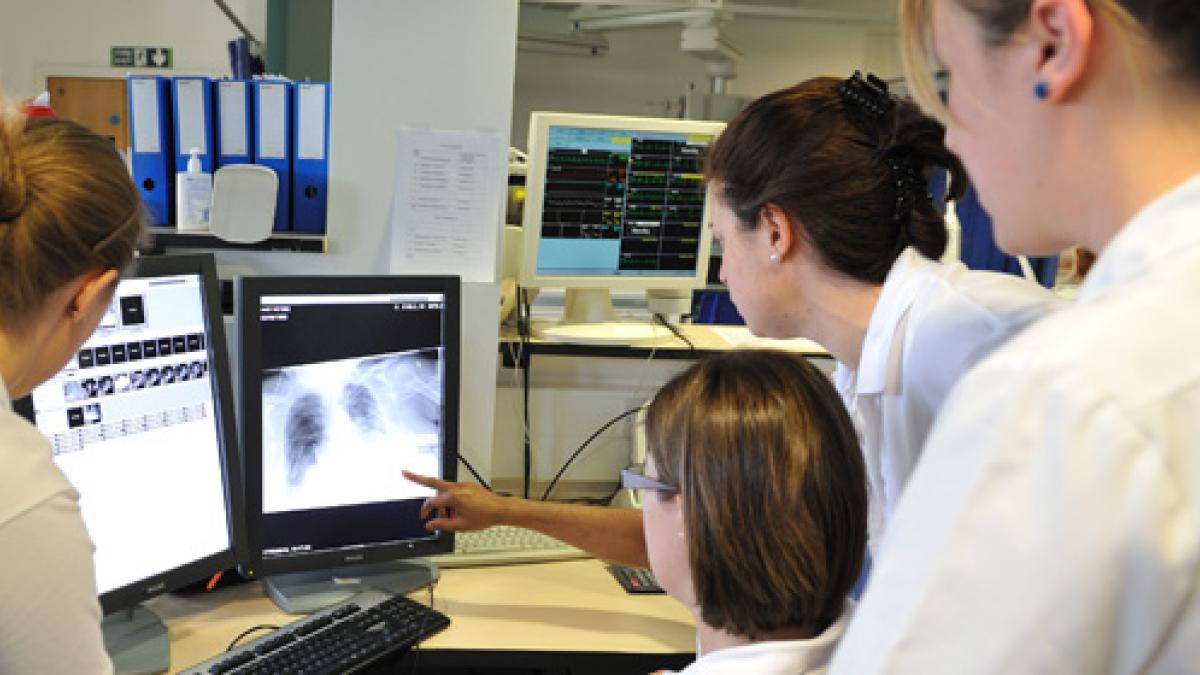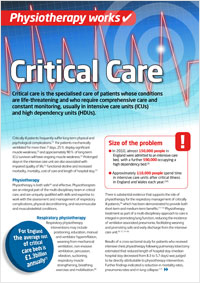Babies, children and adults with life-threatening or severe health problems need a great deal of care. This summary explains how physiotherapy can help.
On this page:
What is critical care?
Critically ill people are admitted to intensive care units (ICU) or critical care units (CCU) because they need constant, close monitoring and specialist equipment to support them.
The monitoring may be of one or more vital organs such as the heart, lungs, kidneys or even the brain. This is known as critical care.

How can physiotherapy help with critical care?
People remain in intensive care for varying lengths of time, depending on the extent of their illness. The patient will usually remain in bed, which can lead to muscle weakness, including the muscles used for breathing.
Muscle wasting, skin sores, joint pain and stiffness (caused by lack of movement) are risks facing patients as they recover from a critical illness.
Physiotherapists will assess patients in critical care for breathing difficulties or coughing, using techniques to help bring up phlegm or to make breathing easier.
Physios will assist patients in breathing independently, and help keep their chests clear of mucus to prevent lung infections.
Physios also aid physical recovery, encouraging patients to sit, stand with support and walk as early as possible. In addition, physios will teach specific exercises to be done at different times of the day.
Some hospitals offer follow-up physiotherapy after a period of critical illness, to help people regain full fitness. If this is not available, your GP or hospital consultant may be able to refer you to your local physiotherapy service for ongoing rehabilitation.
What will happen when I see a physiotherapist?
If you have been critically ill, you were most likely asleep or sedated when the physiotherapist first assessed you. Usually the physio will have listened to your breathing and moved your limbs to assess the impact of your illness or injuries.
As you recover, your physio will work with you and the intensive care team aiming to get you back on your feet and well enough to move to another ward in the hospital.
You may be very weak and tire easily but your physio will be very knowledgeable about your recovery, and will set goals with you to help you achieve this. Everything you tell the physiotherapist will be completely confidential.
Physios are the third largest health profession after doctors and nurses. Physiotherapy has been shown to work through clinical studies and research and is a treatment you can trust.
How can I help myself?
The most important thing you can do for yourself is to stay positive and try to be patient. You may find it helpful to set goals for rehabilitation with your physiotherapist. Recovery can take time. Sitting unsupported on the edge of the bed for ten minutes can be a great achievement.
If your physio has shown you exercises, do these as often as instructed, even though you may tire quickly. Don't worry if you forget how to do the exercises - the physio or support worker can show you again, and may even show friends or family members how to help.
Recovery and critical care
For patients:
- Talk to the team of staff caring for you. Their explanations of your treatment, progress and any anxieties can really help
- Try to orientate yourself to day and time. Any visitors or staff can help with this too
- If you are in pain or discomfort, talk to the team caring for you
For carers, friends, family:
- Talk to your friend or relative, as most people retain some hearing even when asleep or sedated. A familiar voice can be very reassuring
- As with talking, contact or hand-holding can offer reassurance. However, check with staff in case of infection or disrupting equipment
- The physio may show you exercises you can help with, enabling you to help your loved one
- Keep a diary of events. There is some evidence that this can help to answer a patient’s questions when they get better. This will help them to understand their time in intensive care
Guidance and evidence for physiotherapy
- For health professionals making the case for physiotherapy: Physiotherapy Works - Critical Care
Links and further information
- Information for patients: NHS Choices (Intensive care)
- Information for patients and families: Intensive Care Society
- Patients and families share their experiences: Healthtalkonline
Disclaimer:
The content on this page is provided for general information purposes only and is not meant to replace a physiotherapy or medical consultation. The CSP is not responsible for the content of any external sites, nor should selection be seen as an endorsement of them.




































